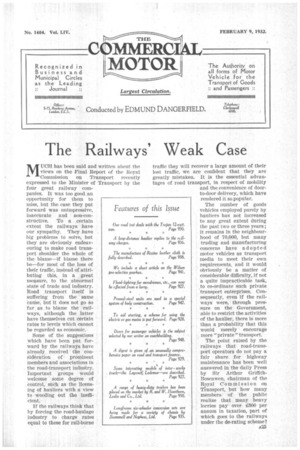The Railways' Weak Case
Page 27

If you've noticed an error in this article please click here to report it so we can fix it.
MUCH has been said and written about the views on the Final Report of the Royal Commission on Transport recently expressed to the Minister of Transport by the four great railway com panies. It was too good an opportunity for them to miss, but the case they put forward was unimpressive, inaccurate and non-constructive. To a certain extent the railways have our sympathy. 'They have big problems to solve, but they are obviously endeavouring to make road transport shoulder the whole of the blame—if blame there be—for most of the loss of their traffic, instead of attributing this, in a great pleasure, to the abnormal state of trade and industry. Road transport itself is suffering from the ' same 'cause, but it does not go so far as to blame the railways, although the latter have themselves cut certain rates to levels which cannot be regarded as economic.
Some of the suggestions which have been put forward by the railways have already received the conSideration of prominent members and associations in the road-transport industry. Important groups would welcome some degree of Control, such as the licensing of hauliers with a view to weeding out the inefficient.
If the railways think that by forcing the road-haulage industry to charge rates equal to those for rail-borne traffic they will recover a large amount of their lost traffic, we are confident that they are greatly mistaken. It is the essential advantages of road transport, in respect of mobility and the convenience of door to-door delivery, which have rendered it so_popular.
The number of goods vehicles employed purely by hauliers has not increased to any great extent during the past two or three years; it remains in the neighbourhood of 70,000, but many trading and manufacturing concerns have adopted motor vehicles as transport media to meet their own requirements, and it would obviously be a matter of considerable difficulty, if not a quite impracticable task, to co-ordinate such private transport enterprises. Consequently, even If the railways were, through pres. sure on the Government; able to restrict the activities of the haulier, there is more than a. probability that this would merely encourage more "private" transport.
The point raised by the railways that road-transport operators do not pay a fair share for highway maintenance has been well answered in the daily Press by Sir Arthur GriffithBoscawen, chairman of the Royal Co mmi ssi on on Ti.ansport, but how many members of the public realize that many heavy lorries pay. over f300 per annum in taxation, part of which goes to the railways under the de-rating scheme?




























































































